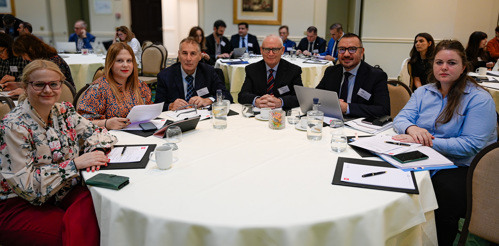Parliamentary Ombudsman participates in ENNHRI General Assembly’s second day discussions on Securitisation and Human Rights
Published October 29, 2024

The second day of the ENNHRI General Assembly in Brussels centred around the pressing issue of securitisation and its impacts on European human rights. The Parliamentary Ombudsman, Judge Joseph Zammit McKeon, joined discussions aimed at examining how National Human Rights Institutions (NHRIs) can respond to the growing trend of securitisation, which has intensified in recent years due to events such as the COVID-19 pandemic and the ongoing war in Ukraine.
The concept of securitisation refers to the process by which a state categorises certain issues as security concerns, thereby justifying extraordinary measures to address these threats. While such measures are often framed as necessary for public safety, they can adversely affect human rights, the rule of law, and democratic practices. These effects can include excessive restrictions, diminished transparency and accountability, and the erosion of civil liberties. As these practices become entrenched, securitisation can alter the standard legal and administrative frameworks governing state security.
ENNHRI has recognised securitisation as a significant thematic priority, with many NHRIs identifying it as a critical area for future preparedness. NHRIs, as independent bodies mandated to uphold human rights, have taken various approaches to respond to securitisation challenges. The responses differ across countries, reflecting diverse institutional structures and the unique challenges each NHRI faces. For instance, some NHRIs focus on addressing individual cases through litigation, while others emphasise monitoring activities, including visits to detention facilities and border areas. Additionally, many NHRIs work on providing general recommendations, conducting studies, and raising awareness of securitisation’s impact on human rights.
Today’s session also included a vote to elect ENNHRI’s Chair, Board members, the GANHRI Bureau, and the Finance Committee. Ms Louise Holck, Director of the Danish Institute for Human Rights, was re-elected as Chair of ENNHRI. The new ENNHRI Board consists of six elected A-status NHRIs, each member holding a three-year term. The Board, led by the Chair, is responsible for setting ENNHRI’s strategic priorities and overseeing the network’s management and administration.
The Finance Committee, also elected by the General Assembly, is critical in overseeing ENNHRI’s financial health and recommending ways to strengthen the network’s financial outlook. This committee advises the Secretariat on financial administration and handles applications for membership fee waivers.